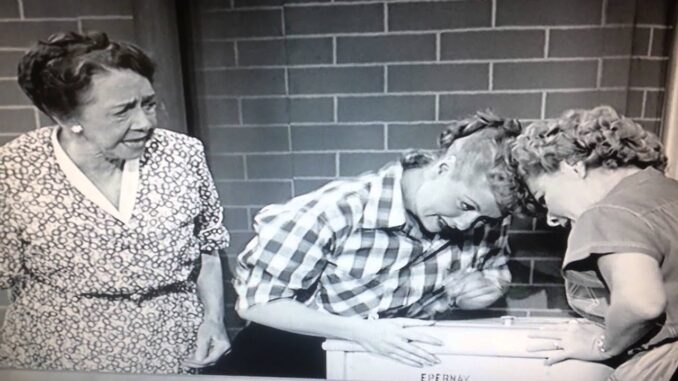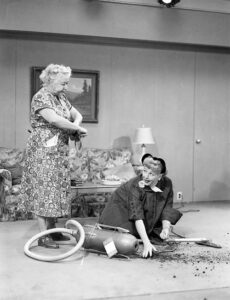
Introduction: A Beloved Classic With a Twist?
“I Love Lucy” is one of the most cherished sitcoms of all time. Its lighthearted humor, iconic performances, and endearing characters have made it a timeless classic. But what if there was more beneath the surface? A growing fan theory suggests that the show’s comedic antics may mask a much darker narrative. Could “I Love Lucy” be hiding subtle themes of discontent, manipulation, and existential struggle? Let’s dive deep into this intriguing theory and uncover the hidden layers of Lucy and Ricky’s world.
The Fan Theory: A Dark Lens on a Lighthearted Show
At the heart of this theory is the idea that Lucy Ricardo’s relentless schemes to achieve fame and recognition weren’t just comedic hijinks—they were a cry for help. Fans speculate that Lucy’s antics stem from deeper feelings of dissatisfaction and an unfulfilled life.
Lucy’s Desperation for Stardom
Lucy’s obsession with becoming a star is a recurring theme. But what if her constant failures represent something more? Some fans argue that her dreams symbolize a yearning for self-worth in a life where she feels overshadowed by Ricky’s success.
Ricky’s Role: Supportive or Controlling?
While Ricky often plays the loving husband, his frequent dismissal of Lucy’s ambitions has raised eyebrows. Could his behavior be interpreted as controlling? Critics of the show argue that Ricky’s actions sometimes reflect a subtle power dynamic that keeps Lucy in a subservient role.
Hidden Themes in “I Love Lucy” Episodes
1. The Chocolate Factory Scene: A Metaphor for Overwhelm
The iconic chocolate conveyor belt scene is hilarious, but it also mirrors the pressures of conformity and the struggles of juggling multiple responsibilities. Is Lucy’s frantic behavior a reflection of societal expectations for women in the 1950s?
2. Lucy’s Schemes: A Cry for Attention
Lucy’s elaborate plans often end in chaos, but they also highlight her need to be noticed. Could her antics be a metaphor for the lengths people go to feel valued in their relationships?
3. Ricky’s Career vs. Lucy’s Dreams
Ricky’s flourishing career contrasts starkly with Lucy’s constant failures. This dynamic raises questions about gender roles and the limitations placed on women during the era.

The Cultural Context: 1950s America
The Pressure of Domestic Bliss
The 1950s idealized the perfect housewife, and Lucy’s character often struggled to fit this mold. Her rebellion against traditional roles may resonate with viewers who see her as a symbol of resistance.
Gender Dynamics in Comedy
Lucy’s comedic brilliance often relied on self-deprecation. Was this a reflection of societal norms that demanded women downplay their intelligence and capabilities for the sake of humor?
Psychological Perspectives on Lucy’s Behavior
1. Lucy’s Need for Validation
Psychologists suggest that Lucy’s constant need for attention could stem from low self-esteem. Her antics might be a way to compensate for feelings of inadequacy.
2. Ricky’s Gaslighting?
Some fans argue that Ricky’s frequent dismissals of Lucy’s ideas could be interpreted as gaslighting. By undermining her confidence, he reinforces his own dominance in their relationship.
The Laughter Masking Pain
Why We Overlooked the Dark Themes
The show’s humor and charm have long overshadowed its more serious undertones. It’s easy to laugh at Lucy’s antics without considering the deeper implications.
Comedy as a Coping Mechanism
For many viewers, the humor in “I Love Lucy” might have been a way to process their own struggles. Lucy’s relatable flaws made her an everywoman, allowing audiences to laugh at life’s absurdities.
What This Theory Means for Fans
A New Way to Watch the Show
Revisiting “I Love Lucy” with this theory in mind offers a fresh perspective. Suddenly, the laughter takes on a bittersweet quality, and the characters’ struggles feel more poignant.
A Testament to Lucille Ball’s Brilliance
If these darker themes were intentional, they highlight Lucille Ball’s genius as both an actress and a storyteller. Her ability to blend humor with subtle social commentary was groundbreaking.
Conclusion: A Classic Reimagined
Whether you buy into the fan theory or not, there’s no denying that “I Love Lucy” continues to captivate audiences decades after its original run. The idea that the show might have a darker undercurrent only adds to its richness. It reminds us that even in comedy, there can be layers of complexity waiting to be uncovered.
FAQs
1. Was “I Love Lucy” intended to have dark themes?
While the show was primarily a comedy, it’s possible that some of the struggles and dynamics were reflective of real societal issues of the time.
2. What is the fan theory about “I Love Lucy”?
The theory suggests that Lucy’s antics represent deeper feelings of dissatisfaction and unfulfilled dreams, with darker themes hidden beneath the humor.
3. Did Lucille Ball acknowledge any hidden messages in the show?
Lucille Ball never explicitly mentioned darker themes, but her nuanced performances often hinted at layers beyond the surface comedy.
4. How does this theory change how we view Ricky Ricardo?
Some fans argue that Ricky’s behavior could be seen as controlling, adding complexity to his role as the loving husband.
5. Should we still enjoy “I Love Lucy” as a comedy?
Absolutely! The beauty of the show lies in its ability to entertain while offering insights into human nature. Whether you see it as lighthearted or layered, “I Love Lucy” remains a masterpiece.